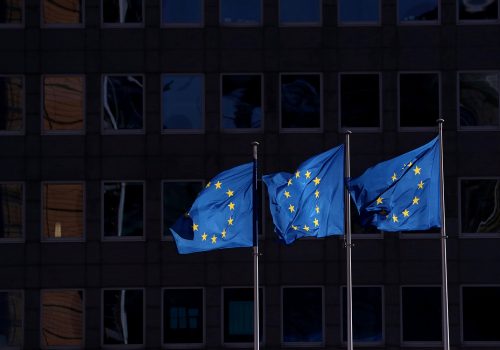CORONAVIRUS ALERT 4/1/2020
The Atlantic Council’s Coronavirus Alert is a regular summary of policy, economic, and business events around the emergency. To stay updated, sign up to the Coronavirus Alert here.
Summary:
US President Donald J. Trump said the United States faces a crisis without precedent and, in a notable change of tone, exhorted Americans to face a grim couple of weeks ahead at least. The federal government raced to build field hospitals to take pressure off health systems beleaguered by the coronavirus pandemic as the United States had by far its biggest tally of deaths in one day.
Statistics:
There are now in excess of 870,000 cases worldwide in 180 countries and territories; more than 43,000 people have died.
QUOTE: “I want every American to be prepared for the hard days that lie ahead,” President Donald J. Trump said in his March 31 press conference, the BBC reported. “This is going to be a very, very painful two weeks.”
HEALTH AND SCIENCE:
- President Donald J Trump exhorted Americans to brace for a crisis without precedent as the United States faces the prospect of between 100,000 and 240,000 coronavirus deaths, with a peak in infections expected to be at least two weeks from now, The Wall Street Journal reported. “This could be a hell of a bad two weeks,” Trump said during a White House briefing on March 31, the newspaper said. The president adopted “a newly somber and sedate tone,” The Washington Post said. “No sugar-coating: Trump changes tack on coronavirus crisis” reads a BBC headline.
- The United States posted a daily increase of more than 850 deaths on March 31, nearly half of them in New York State, Reuters reported, citing its own tally. That makes it by far the biggest death toll in a single day, and takes the total number of fatalities to 3,393, the news service said. The federal government raced to build as many as 341 field hospitals near major cities as health systems are stretched to and beyond their limits, Reuters reported.
- China reported a steep increase in coronavirus cases as the National Health Commission started to include those displaying no symptoms amid concern about so-called “silent carriers,” particularly those returning from overseas, The Washington Post reported. On top of the thirty-six new cases displaying symptoms on March 31, all but one arriving from abroad, a further 130 asymptomatic people tested positive, the newspaper said.
- Seven countries have recorded more than 40,000 cases of coronavirus, led by the United States, Italy, and Spain, CNBC reported, citing data from John Hopkins. CNBC publishes charts that show infection curves in those countries, as well as China, Germany, France, and Iran.
- New York City Mayor Bill de Blasio called on plastic surgeons, oral surgeons, and veterinarians to donate spare ventilators, Bloomberg reported. The city, which started with 5,000 ventilators and has added 2,500 from federal supplies in the past week, needs about 15,000 machines, the newswire said. “This is a war effort,” Bloomberg cited the mayor as saying. “Everyone needs to contribute.”
- Dr. Deborah Birx, the White House’s coronavirus response coordinator, raised concerns about the number of ventilators in the UK, Sky News reported. The 8,000 machines there would translate to fewer than 40,000 in the United States. “We have five times that,” Sky cited her as saying.
- French companies led by industrial gas company Air Liquide will join forces and try to make 10,000 ventilators in fifty days, the Financial Times reported. President Emmanuel Macron set out the plans while visiting a medical-mask factory in the west of France on March 31, the newspaper said. Ford said this week it will join forces with General Electric’s medical division to produce 50,000 machines in the next 100 days, while the UK has committed to buy at least 40,000 ventilators, including those designed from scratch, the FT said.
- The UK, Italy, Spain, France, and Russia recorded their highest daily death toll from coronavirus, The Independent reported. Deaths in Spain have now exceeded 9,000 after 864 people died in one day, the online newspaper said.
- A milder than usual flu season in 2019 to 2020 may provide a clue to why so many Italians have died from coronavirus, Bloomberg reported. The flu season, with unusually warm weather, led to fewer deaths of older Italians, making them an “outsize target” in February and March, the news service said, citing a report by the Italian Ministry of Health.
- Countries in Europe facing a surge in the need for intensive-care units are building makeshift hospitals, transporting coronavirus patients from overwhelmed cities by military jet and high-speed train, and calling in medical students, retired healthcare staff, and cabin crew with first-aid skills, the Associated Press reported. Germany and Italy moved to prolong restrictions until after April 12, Bloomberg reported.
- Scientists and technologists from eight countries will launch a contact-tracing app on April 1 called Pan-European Privacy Preserving Proximity Tracing in an attempt to check the halt of coronavirus, CNBC reported. The European Union’s GDPR legislation makes it difficult to use location data from smartphones, CNBC said.
- “1.3 billion people. A twenty-one-day lockdown. Can India curb the coronavirus?” asks the journal Science. “Just lockdown without testing is only postponing the surge,” says former Indian health secretary K. Sujatha Rao, Science reported. India, the world’s second most populous country, has 0.7 hospital beds per 1,000 people, compared with Italy’s 3.4 and 2.9 in the United States, Science said.
- Scientists in Germany, Europe’s most populous country, had developed a test for coronavirus by mid-January, with labs nationwide ready to start using it only weeks later, the Associated Press reported. That, combined with the country’s large number of intensive-care units and early social-distancing measures, may help explain why the death rate from coronavirus in Germany seems to be much slower than neighboring nations, AP said.
- Philip Morris International and British American Tobacco are trying to use the tobacco leaf as a defense against coronavirus, Bloomberg reported. Medicago, the partially owned Canadian division of Philip Morris, expects to start trials for a potential vaccine this summer, the news agency said.
- Schools, restaurants, and gyms in the Netherlands will remain closed through April 28 at least, extended from April 6, Reuters cited Prime Minister Mark Rutte as saying. Last week the country strengthened a ban on public gatherings and extended the measure until June, the news service reported.
QUOTE: “The challenge for individual Americans—one we can help each other to meet—is to deal with the dismal numbers without losing heart or backing down,” David Von Drehle writes in The Washington Post. “Our task as citizens is to hold the line until the new numbers work their magic. These are the numbers behind genetic sequencing and artificial intelligence. To a degree never before possible, they give us power to understanding a pandemic even as it races to kill us.”
FINANCE AND ECONOMICS:
- The International Monetary Fund said the global economy has now entered recession with recovery unlikely until 2021 as coronavirus and the response to it reshape the world, The New York Times reported. “This is the moment to dismantle trade barriers, maintain open trade, and re-establish supply chains,” the United Nations said in a report, the newspaper added.
- Banks are in line to make billions of dollars in processing fees of between 1 and 5 percent on $350 billion of loans offered to small businesses in the United States as part of the federal economic stimulus package in response to the coronavirus crisis, the Financial Times reported.
- The European Commission has proposed a wage-support program to help countries, such as Italy and Spain, most affected by coronavirus, Bloomberg reported, citing a tweet by Ursula von der Leyen, its president. The Commission will adopt a proposal on April 2 to tap capital markets to fund the 100 billion euro program, the Financial Times reported.
- Copier maker Xerox is stopping its hostile takeover attempt of bigger rival HP because the coronavirus crisis undermines its ability to make the debt-heavy merger happen, The Wall Street Journal reported. That marks the end of a five-month offensive by Xerox and illustrates how coronavirus has stymied the world of deal making, the newspaper said.
- “Despite early stumbles, European leaders should be commended for their cooperation in tackling the coronavirus crisis,” write the Atlantic Council’s Benjamin Haddad and Josh Lipsky. “Unfortunately, that was the easy part. It’s time for the Eurozone to unleash more fiscal firepower.”
QUOTE: “The duration itself is debilitating and exhausting and depressing,” New York Governor Andrew Cuomo told a news conference, Reuters reported.
BUSINESS AND TRAVEL:
- BP will cut investment by a quarter this year as it expects oil and gas production to drop, The Wall Street Journal reported. The company, which expects to take a $1 billion impairment charge in its first-quarter results because of coronavirus, plans to cut costs by $2.5 billion in the next two years, the newspaper said.
- Bankruptcies of hotels and restaurants in Sweden increased by 123 percent in March as people stopped traveling and socializing because of coronavirus, Bloomberg reported.
- The Edinburgh Festivals will be cancelled this summer, the first time in seventy years for the Scottish cultural event, the Financial Times reported.
QUOTE: The combined effects of coronavirus and its economic impact may lead to “enhanced instability, enhanced unrest, and enhanced conflict,” said United Nations secretary-general Antonio Guterres, The Irish Times reported.
RESOURCES
- Johns Hopkins University interactive web-based dashboard to visualize and track reported cases in real-time.
- CDC provides frequent updates and background information on Coronavirus.
- The World Health Organization daily situation reports.
- Harvard Business Review guidance on managing the emergency for corporate decisionmakers.
- The Society for Human Resource Management resources on managing communicable diseases.
- The Wall Street Journal has a useful guide to travel and travel insurance.
- State Department Travel Advisory for China.



